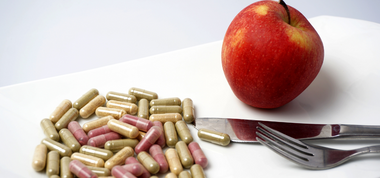If your family has a history of heart disease, here's what you need to know

This week we tried something new at Step One Foods. We created an educational talk followed by a live Q&A session that we streamed online.
One of the questions that was asked during that live session is the basis of this week’s blog. John from Mora, Minnesota inquired what would a cardiologist recommend that a patient, who has a family history of heart issues, but hasn't experienced any themselves, do to prevent potential future problems?
I responded to this question during the live session and wanted to expand on my answer even further.
Probably the first thing to know is that heart disease is not pre-ordained, even in someone with a family history. The 80/20 rule applies – there’s about 20% of heart disease that’s genetically driven and 80% that we have a lot of control over.
In terms of addressing that which we have control over, the first thing to do is fix the obvious. If you’re a smoker, you must quit. If you’re inactive, you need to find ways to incorporate more movement into each and every day. And if you’re not sure if you have high blood pressure, high cholesterol or high blood sugar, get those tested!
In addition, you may want to look into more advanced blood testing to see if you are at higher risk than routine tests would indicate. Checking your Lipoprotein A (LpA) and your homocysteine levels makes sense. LpA is an extra protein that attaches itself to LDL (bad) cholesterol and makes it more toxic. There are no good treatments for lowering LpA levels, so the approach is to be even more aggressive about lowering LDL than would be otherwise called for (if you can’t get rid of the LpA, at least you can make sure there’s a lot less toxic LDL floating around by reducing LDL itself). Homocysteine is a byproduct of protein metabolism and works to make the lining of the arteries more “sticky” – making it easier for LDL to attach itself to blood vessel walls. Elevated levels of homocysteine can indicate a vitamin B deficiency and can be normalized with vitamin B supplementation.
Another marker of risk is Apoprotein B. Turns out all the cholesterol particles have various proteins (“apoproteins”) attached to them. Apoprotein B happens to like attaching itself to small dense LDL particles (the worst kind of LDL which is especially likely to get into artery walls). So checking an ApoB level can help determine if your otherwise acceptable looking LDL number is actually more toxic than it appears.
Finally, from a testing perspective, there are individuals whose numbers fall in between great and dangerous and in whom it’s not clear whether medications need to be started to reduce risk. Those individuals can benefit from imaging tests – like the coronary calcium scan or the carotid ultrasound test – to see if there is evidence of early plaque build up. The coronary calcium scan, especially, has a lot of data behind it – and a scan that shows no calcium build up in coronary arteries is associated with an excellent near-term prognosis and risk that is so low it can’t actually be lowered much further by adding drugs.
After the testing part, remember the fundamentals. People live long well because they LIVE WELL. Not because they’re on the perfect cocktail of drugs. Nutrition, especially, is the foundation of health – because we have to eat multiple times every day, making the effect of food super cumulative. So, regardless of whether or not you have a family history of heart disease, commit at every meal to try and build health rather than disease with what you eat. And whenever you need help with that, or just want to be sure you’re doing the right thing, reach for Step One Foods. The entire line was created to help build health through food super easy.
Watch my video response to learn more.

Tested & Proven Results.
- Cardiologist formulated
- Supported by over 500 publications
- Clinically-proven, in a double-blind randomized trial with Mayo Clinic and The University of Manitoba
80% of participants lowered their cholesterol in just 30 days. With just two servings per day, Step One Foods offers a proven-effective way to naturally lower LDL (bad) cholesterol.
Get heart health tips and articles like this, delivered right to your email.
New articles every week.
You may also like...

Supplements for cholesterol lowering? Not so fast.

You don’t need to avoid foods with cholesterol…except for these



